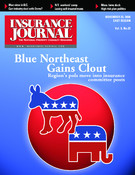Look around you. Take a long look at the folks in your agency or company. And then break out your calculator.
What is the average age of your employees or colleagues? What percent of your firm’s workforce were already adults when the Challenger crashed, and how many were still in Little League? What percent of your staff are likely to retire in the next 10 years? And how many are still checking the “24-35” age box on forms?
These are not idle questions. Nor are they intended as a glib assault on older workers. Mature professionals are invaluable to our industry, offering the experience, judgment and insight that only comes with time. Indeed, at the tender age of 54, I feel like I have not yet hit the pinnacle of my career.
But I worry.
This year, the oldest Baby Boomers are reaching age 60. More than 10,000 turn 50 every day, and the youngest are turning 42. Within the insurance industry, the average shareholder age among Best Practices agencies is 54, which means the best of the best will be retiring within the next 10 to 15 years. Who will take their place? There is a dearth of young talent entering our ranks, an ebb in the flow of bright men and women to follow our lead and inherit our roles. And that scarcity will have a detrimental impact on all of us — agents, companies and, eventually, the customers we serve.
What is at the heart of this talent shortage?
Several factors at play
Poor image. The insurance industry has long been burdened with a dull, negative reputation, and young people in particular are unenthusiastic about our field. Sure, some days are more interesting than others but, overall, insurance is a great gig. There are an abundance of different opportunities to suit virtually any personality or skill set. We are given the opportunity to work with a variety of clients, and we can do so from virtually anyplace in the country (or the world). And insurance has provided a very nice life for all of us. Unfortunately, few people realize these facts.
Few programs. Only about 30 U.S. colleges or universities offer insurance as a major or minor, compared to the ubiquity of accounting, marketing and other business curricula. As a result, our industry is not top of mind among most students. InVEST, a leading school-to-career program, is trying to overcome that lack of training through a hands-on curriculum taught in high schools, community colleges and vocational institutes.
Apathy. Truth be told, no one seems to be worried about this shortage of qualified personnel. I sometimes hear company CEOs or other industry leaders bemoaning it — but not really working on it. Agents often complain about it, but there isn’t much effort made to reverse the trend. Indeed, agencies overwhelmingly recruit producers from other agencies or insurance carriers, and few have a perpetuation plan for their firms — two clear indicators of our system’s inadequate pursuit of new talent.
Ours is an industry deserving of a future. We owe it ourselves to perpetuate our businesses and to protect our clients’ future with a new generation of bright, skilled men and women.
Act within your community, your state or on a national stage. Contribute your ideas, your time and your resources to this search for quality.
Patrick C. Moore CPCU (pmoore@antalek-moore.com), is chair of InVEST, the premier insurance industry-education partnership, and is principal of Antalek & Moore, an independent agency in Beacon, N.Y.
Topics Agencies Training Development Market
Was this article valuable?
Here are more articles you may enjoy.


 Florida Insurance Costs 14.5% Lower Than Without Reforms, Report Finds
Florida Insurance Costs 14.5% Lower Than Without Reforms, Report Finds  AIG Underwriting Income Up 48% in Q4 on North America Commercial
AIG Underwriting Income Up 48% in Q4 on North America Commercial  ‘Structural Shift’ Occurring in California Surplus Lines
‘Structural Shift’ Occurring in California Surplus Lines  Insurance Broker Stocks Sink as AI App Sparks Disruption Fears
Insurance Broker Stocks Sink as AI App Sparks Disruption Fears 


